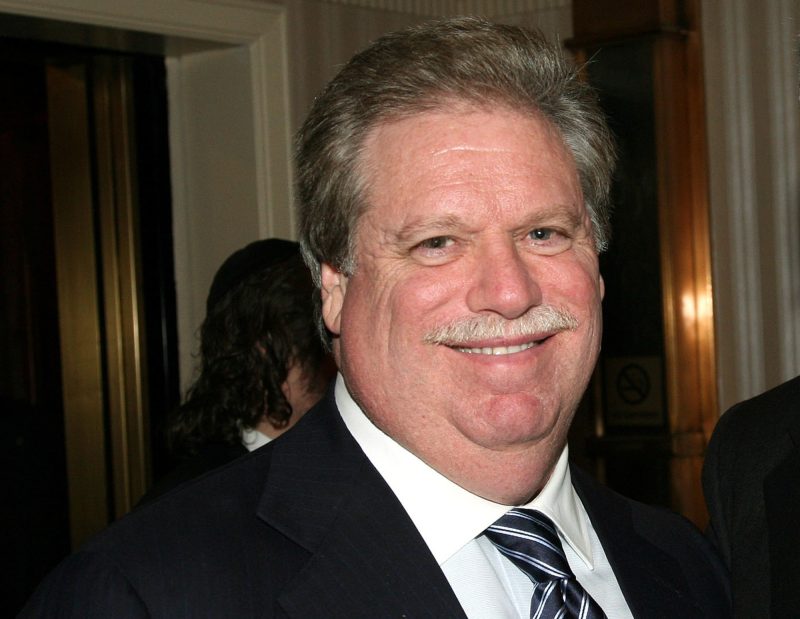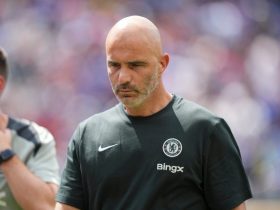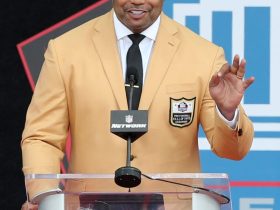Elliott Broidy, a former top Republican fundraiser who admitted to illegally lobbying the Trump administration on behalf of foreign nationals, described his actions publicly Tuesday for the first time, testifying in court about his failed attempts to quash a federal investigation of a Malaysian financier and to spur U.S. officials to extradite a wealthy Chinese dissident living in New York, whom Beijing had branded a criminal.
Although he could have pocketed up to $75 million if his efforts had succeeded, he told a federal jury, he wound up with far less: an $8 million retainer and a $1 million “appearance fee” for traveling to Thailand for a secret meeting.
Broidy, who pleaded guilty in 2020 to conspiring to violate the Foreign Agents Registration Act and was later pardoned by President Donald Trump, is cooperating with the Justice Department in criminal cases involving Malaysian financier Low Taek Jho and his associates in the United States. Authorities say Low and others profited from the theft of $4.5 billion from Malaysia’s sovereign wealth fund.
Low, 41, is a fugitive, while one of his associates, Prakazrel “Pras” Michél, a former member of the Grammy Award-winning 1990s hip-hop trio the Fugees, is on trial in U.S. District Court in Washington, accused of money laundering and other federal crimes related to his dealings with the missing Malaysian businessman. Michél, 50, has denied any wrongdoing.
During the 2016 presidential campaign, Broidy, then a Los Angeles-based investor, helped corral big donors to support the Trump campaign. After Trump took office in 2017, Broidy was named deputy finance chairman of the Republican National Committee.
Testifying for the prosecution Tuesday in Michél’s trial, he told the jury about a labyrinthine scheme, hatched in 2017, in which he stood to collect up to $75 million from Low in return for illegally using his influence in the Trump administration to ease Low’s legal woes. Part of the convoluted plan — which Broidy said was brokered by Michél — involved urging officials to return the dissident Chinese national to Beijing. But the efforts came to naught.
Broidy expressed no clear remorse on the witness stand as he described the illegal lobbying in mostly clinical terms. Under questioning by a prosecutor, he repeatedly used phrases such as “business opportunity” and “the deal terms.” As for helping Low, he referred to leveraging “my relationships in the administration with the president and others who could be relevant.”
Authorities have said that Low was a leader of small circle of kleptocrats in Kuala Lumpur who looted the Malaysian fund known as 1MDB. In the United States, starting in the late 2000s, he spent tens of millions of dollars on wild parties and bestowing lavish gifts on many of the celebrities — actors, musicians, socialites — whom he cultivated as acquaintances.
As for Michél, after the Fugees split up in 1997 and his solo career as a rapper waned, he reinvented himself in the 2000s as a private-equity investor, eventually becoming a business associate and close companion of Low’s, according to prosecutors.
By 2017, the FBI and Justice Department were closing in on Low, conducting a criminal investigation related to the 1MDB scandal and bringing a major civil action against him, aimed at seizing hundreds of millions of dollars in ill-gotten assets. That was when Low turned to Broidy, whom the prosecution described as “the fixer.”
Broidy testified that he, Michél and another business associate flew to Thailand in spring 2017 to secretly meet with Low. Broidy said he eventually agreed to lobby the Trump administration, seeking to short-circuit the federal legal actions, for a fee of either $50 million or $75 million, depending on how long it took him to succeed.
He told the jury that he tried, through intermediaries, to sway top administration officials into believing it would be detrimental to U.S.-Malaysian relations for the Justice Department to continue involving itself in the 1MDB matter. He said he tried in vain to arrange for Trump to play a round of golf with then-Malaysian Prime Minister Najib Razak so that Razak could tell Trump that the 1MDB scandal was not significant.
Razak was eventually sentenced to prison in Malaysia for his role in the embezzlement.
With his efforts failing, Broidy said, he met with Low again in 2017, in mainland China. He said this meeting included a top Chinese domestic security official.
Low seemed to think that Chinese authorities could help him in some way with his legal problems, and because of that, Low wanted to please the Chinese. Broidy said Low and the security official asked him to use his influence in the Trump administration to secure the extradition of the wealthy Chinese national Guo Wengui, an outspoken critic of China’s government who was living in New York under a temporary visa.
The security official described Guo as a criminal, Broidy said.
He said the official promised that in return for Guo being deported, China would release American detainees in its custody and possibly enter into a new cooperation agreement with the United States on cybersecurity issues. Broidy said he conveyed this to various officials in Washington, including at the White House, telling then-Chief of Staff Reince Priebus that extraditing Guo would be “an incredible step forward” in U.S.-China relations.
But these efforts also failed.
Ultimately, even though Guo wasn’t deported, Michél received “over $70 million” from Low, according to prosecutors. Guo has since been indicted by a federal grand jury in New York in an unrelated financial fraud case.
By April 2018, Broidy stepped down from his position with the Republican National Committee after it was reported that he had paid a former Playboy model $1.6 million in return for her silence about a sexual affair. Then, as the FBI investigation into Low intensified, he was charged in 2020 with illegal lobbying and pleaded guilty in a deal with prosecutors.
The agreement called for him to cooperate with federal prosecutors. And he said he is continuing to do so, despite having been pardoned by Trump. After the pardon, Broidy said, he signed a new deal with prosecutors, agreeing to maintain his cooperation in return for not being newly charged with different crimes related to the illegal lobbying.








